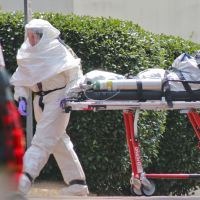India Not Equipped to Handle Ebola
 Medical workers roll an Ebola patient into hospital in the U.S. (file photo: John Spink/ Reuters)
Medical workers roll an Ebola patient into hospital in the U.S. (file photo: John Spink/ Reuters)
As India faces the prospect of the global Ebola epidemic eventually arriving here, the National Centre for Disease Control (NCDC) has issued guidelines to stop the entry and spread of the disease. But as the Indian Express reports, there is a shortage of the protective equipment, testing labs and professional training required to face the threat.
Ram Manohar Lohia Hospital in Delhi has been selected to be at the frontline of India’s defences if Ebola hits – an isolation intensive care unit was opened there in August, but it isn’t quite ready yet.
“We do not have respirators, and we have never worn goggles,” a nurse told The Indian Express. “And we have no experience with the virus. We have met the nursing superintendent and asked for classes.”
Since October 19, healthcare professionals from across India have begun training in handling Ebola. They will then be expected to disseminate the information to colleagues in their states.
Yet the Indian Express reports that health workers have voiced concerns over the lack of protective equipment, such as hazardous-material suits, masks and goggles. The Health Ministry has purchased 50,000 kits for distribution to the states, but it is not clear how long this process could take.
The World Health Organisation (WHO) has already warned that India’s problems could be compounded by the fact that Ebola’s early symptoms resemble those of dengue and malaria, common across large parts of the country at this time of year.
“We just can’t isolate every patient who shows up with fever, diarrhoea or vomiting, which are all non-specific viral symptoms that could indicate any seasonal disease, or Ebola,” a NCDC scientist told the Indian Express.
“Our immediate focus is to ensure that not a single case enters the country during the peak of these seasonal diseases. Preparations and public health education by airlines, at airports, and among health workers are being scaled up to ensure this,” he said.
Laboratory tests are the only means to distinguish Ebola from other diseases. But there are only two labs in India that can carry out the test: the NCDC in Delhi and the National Institute of Virology (NIV) in Pune. These labs have tested 96 samples so far and staff claim their resources are already stretched to the breaking point.
According to the report, there has been no effort to reach out to doctors in private practice, who are likely to be first points of contact for many patients. No private diagnostic facilities have been identified.
Peter Piot, who discovered Ebola in the 1970s, recently said he feared for what would happen if the disease hit India, since few medical professionals here wore gloves when tending to patients. “They would immediately become infected and spread the virus”, he pointed out.
The government has so far focussed on airport screening. Since October 15, over 22,000 passengers have been screened, seven of whom were identified as medium-risk individuals, and another 56 as high-risk. The high-risk passengers have been placed under observation for 30 days.
But this screening is not foolproof. “We must realise that Ebola has a long incubation period,” a doctor involved in screenings at Delhi’s Indira Gandhi International Airport told the Indian Express. The WHO recently reported that symptoms have sometimes been showing up as late as 42 days after individuals were infected – which means that someone may be carrying the virus without appearing to be ill.
As the world wakes up to the danger of Ebola, India should gear up to face the challenge – while it still has the time.
To Learn More:
EXPRESS INVESTIGATION: In path of possible Ebola storm, without masks, gloves and training (by Pritha Chatterjee and Arshad Ali, The Indian Epxress)
In the season of Ebola virus scare, national disaster agency is adrift and headless (by Praveen Swami, The Indian Express)
Ebola in Sierra Leone increasing to rate of more than 20 deaths per day (by Dajana Suljkanović, The Guardian)
Ebola serum for Africa patients within weeks, says WHO (by Michelle Roberts, BBC News)
- Top Stories
- Controversies
- Where is the Money Going?
- India and the World
- Appointments and Resignations
- Unusual News
- Latest News
- India College Chain’s Expansion into U.S. Draws Opposition from Massachusetts Officials over Quality of Education
- Milk Shortages in India Tied to Release of New Movies Featuring Nation’s Favorite Stars
- Confusion Swirls around Kashmir Newspaper Ban in Wake of Violent Street Protests
- Polio-Free for 5 Years, India Launches Vaccine Drive after Polio Strain Discovery
- New Aviation Policy Could Increase Service, Lower Ticket Prices






Comments